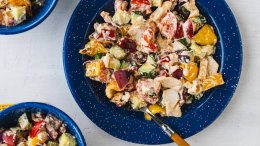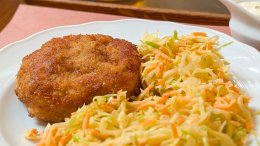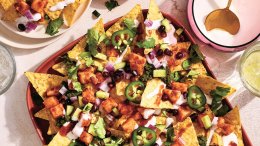If my countertops aren’t covered in flour and lumps of dough once I’m done baking a batch of cookies, something has seriously gone wrong. To me, successful baking resembles a sort of chaos, and thanks to Charmian Christie’s brilliant new cookbook, The Messy Baker, I can confidently celebrate my unsightly countertops, imperfect cookies, and embrace the fact that my scones will never look like the ones on TV.
Genuine, inspiring and representative of everyday challenges that we face in the kitchen, The Messy Baker’s 75 delicious recipes accompanied by endless baking and cooking tips and tricks make Christie’s cookbook a must have in every kitchen, cookie dough splattered or not.
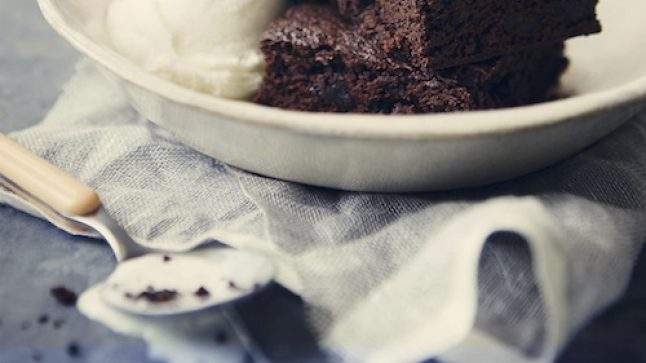
What was your inspiration behind the cookbook? Was a cookbook your ultimate goal?
Writing a cookbook was not actually something that I always wanted to do. I had heard so many people say, "You never want to write a cookbook. It’s so much work and there is no money in it."
I am passionate about food and I am evangelical about getting people back in the kitchen, so it was an evolution. My mom was born at the height of the Great Depression so I really learned how to adapt recipes that were going off the rails and learned how to camouflage things that were left imperfect. We never celebrated things that were gorgeous. You know how you get a lumpy scone left over [from ends and corners] of dough? The lumpy scone was always the one that everyone in my family wanted. We celebrated the uniqueness of everything, and we had a very relaxed attitude, mainly because you never wasted anything.
I started with a blog because I loved writing about food. I was exploring how I felt about food through journaling when I was working as a play writer. When I started to blog, I had no idea what I was doing. There were no photos, just words, and it began to evolve. Years later, I wound up with an app: Kitchen Disasters & Fixes, and an agency contacted me and said I should write a book.
What was the best part about writing it?
There were so many good parts. When I first sold the proposal, I was truly in disbelief that anybody believed I could do it. I was stunned that an editor from a big house like Harper Collins thought I could do this, so that was a big boost—terrifying, but it was a boost. Every step of the way I have been encouraged when I was working on the recipes. I wanted to create solid recipes for the home cook, not the home economist, and when I went to get the photography done, it was an amazing experience to watch my food be made up by stylists and have it look beautiful, but messy.
The first time the photographers took a picture of something, I actually teared up. I was so emotional about it, because they were seeing beauty in my food that I hadn’t seen myself. The whole process had its ups and downs of course; no one likes to hear that things need to be reviewed again or tweaked or changed, but it was necessary and it made the book so much better.
Do you have a favourite recipe in the book?
Double-stuff uber-Oreo cookies. Every time I make those cookies, people just light up and the common reaction is, “Oh my gosh, you made Oreos!” It’s as if I had done something superhuman, but really, it’s not that hard. It’s a little fussy because you have to make them in stages, but to see the joy on people’s faces when the filling oozes out of the cookie and the different ways people actually eat them is just so fun. People are fascinated by these cookies, and I get the feeling that they might actually go home and make them, which of course, makes me happy. Everyone has a ginger cookie recipe and everyone has a scone recipe, but for some reason, the Oreos really resonate because they remind us of our childhood.
I love how your cookbook is divided into chapters like “smudgy", "flaky", and "crumbly” instead of “appetizers" and "mains". Where did this idea come from?
Once we decided on the name of the book, it had to tie in with “mess”. My agent and I thought, "What’s the point of calling it The Messy Baker if you’re not going to have that theme run throughout the book?"
We finally decided on the mess factor: flaky, sloppy, dippable, drippy and came up with a fairly unique approach. The mess factor was something that people could recognize, and people could relate to being messy bakers.
If you saw my kitchen after a marathon baking session—oh, my goodness. Seriously, I have vacuumed walls. You drop a bag of flour, or you put the stand mixer on high when you think it’s on low. It’s all about being approachable and genuine. Not everyone has a professional kitchen with stainless steel countertops and all the space in the world.
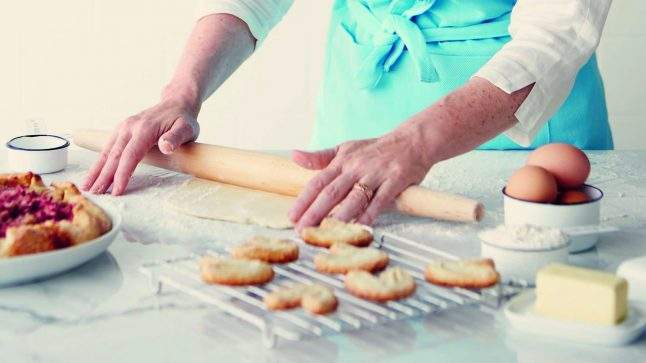
You mention your mom throughout the The Messy Baker and she has obviously been a huge inspiration for you. Is there one thing she has taught you that you can't imagine not knowing today?
Our attitudes, and selling what we create. You have to sell what you made as though it’s the way you intended it to be even if it’s a disaster. If your cake falls in the middle, you just fill it up with whipped cream in the centre and you present this cake that looks stunning, and you do not tell them, “Oh well, I wasn’t sure if I should have put it back in the oven,” or “Oh, well I didn’t have time to make another one.”
We really undermine ourselves with an attitude. If my mom made a cake that got dried out, she found a way to reinvent that recipe and you would just love whatever she presented. She made trifle, she did parfaits, you name it. If the cookies burned, she would scrape up all of the burned bits and would convert them to cookie crumbs for a pie crust. She could take anything and turn it into a positive and we would love everything she made. Taste trumps looks, and if you present it as though that’s the way you intended, people will just do anything they can to get at it.
If I had a bakery, of course I would have to make sure that every cookie was the same size and that no body felt ripped off, but that’s going to derail the home cook. It puts one more barrier between them and the finished product, and all it takes is one barrier for most people to walk away.
The Messy Baker’s section on kitchen gadgets and useful tools is a great addition to the cookbook. Is there one tool you believe everyone needs to own?
Oh! This is my go-to: a Microplane. You know, I should have shares in the Microplane stock. I love them. It has replaced my garlic press and my need for many other gadgets. I’m a small person with little hands and I have broken three garlic presses because I grow my own garlic and they are large cloves. I now Microplane it and it becomes this gorgeous mush that dissolves into whatever I’m making. I also freeze ginger and grate it on a Microplane. It just transforms into this amazing powder. You get all of the flavour without all of the fuss. I use it for chocolate, Parmesan cheese, nutmeg (pre-ground nutmeg should not be sold, by the way; it’s just useless). Buy whole nutmegs; it’s a whole different experience. I don’t have a nutmeg grater, don’t have a garlic press, and I haven’t thrown any ginger out since I use my Microplane. I think I’ve actually used mine so much I finally need to replace it.
Your app, Kitchen Disasters & Fixes, is a brilliant tool for people who run into trouble in the kitchen. Where did you learn all of these tricks to fix common kitchen disasters?
A lot of the answers came from my mom, but many of them were things that I learned on my own because I was a university student that knew how to bake but knew little about cooking. I moved to London, England and thought their chili powder was like our chili powder here in Canada. Let’s just say I quickly learned how to tame super spicy stew since their powder is more like cayenne pepper. I had no money, and when you’re a starving student, you’re motivated to fix things and I never liked wasting.
Some of these things I learned simply because I had made a mistake. For years I burned rice. I could not cook rice to save my soul, and now I have a method for it (that’s in the app).
What is one fun fact or substitution that most of us don’t know (and should)?
I have a whole section at the back of the cookbook on adjusting cake pan sizes. Though my editor initially wanted to leave this section out, I insisted because some people just have one pan. It may be an eight-inch round pan when a recipe calls for a nine-inch round pan. Then what? This is the most practical substitution in the book and I had lots of people emailing me about cake pan sizes asking what they should do. Stuffing too much batter into the wrong size pan doesn’t work, and if I had known this when I was a student, I would have known how to deal with this and would have saved myself so much grief.
What ingredient, in your mind, deserves more attention?
It depends on whether we are talking sweet or savoury. With sweets, you can never underestimate good-quality vanilla. Never ever use the fake vanilla. You can never go wrong by adding vanilla to a sweet dish. Even if a recipe doesn’t call for a little vanilla, still sneak a little in there.
With savoury, people can get a little stodgy. Fresh herbs are great. Have you ever been to a restaurant and had Spanakopita and it’s just kind of lifeless? With the spinach dill pocket recipe in my book, it’s a standard Spanakopita recipe with the exception that I have added fresh mint, dill and a little fresh lemon zest. Those fresh herbs and lemon zest just brighten it up and it just removes the heaviness from them. Citrus is always a lovely addition to savoury.
What are a couple of ingredients that you can't live without?
A really good-quality chocolate makes such a difference when you’re baking. Vanilla pods are another, and I make my own vanilla sugar with it. I love vanilla pods and you can reuse them after you scrape out the caviar [seeds] in the center. The eel portion—the long scary stuff [bean]—you put in sugar and you can either grind it up or let it mellow over time. Put that in your coffee and people will go crazy.
I love lavender, but I have to be really careful with that because it’s easy to put too much into whatever you’re making, and then it tastes soapy. Ginger; I am big on that too.
Right now I’m most in love with smoked paprika. You only need a tiny bit. You’ve got to treat it with respect because it can be too much as it’s more powerful than paprika. It adds an exotic flavour without being weird. It’s a lovely addition to things in which you would use regular paprika.
Much to my sister’s dismay, I also love cilantro.
What will we never find in your pantry?
Artificial sweeteners or artificial vanilla. And, you’re definitely not going to find cake mix. I don’t do that baked marshmallow spread that you can buy. Basically, you’re going to find stock ingredients as opposed to pre-made. You will also not find white chocolate chips; I just really don’t like them at all. In a nutshell, you’re going to find ingredients that allow you to construct something yourself.
What are your general plans for the future? Can we expect another cookbook?
Much to my shock, I am thinking of another book. I did not expect this book to be received with so much enthusiasm. I honestly was expecting to be ignored. I’m having a lovely experience with people who are not just polite in their enthusiasm, but genuinely enthusiastic, so this tells me that I have done a good job and that I could do a good job again with some form of a second book.
I’m hoping to do more in-person demonstrations and take part in more food events. I’ve always said it would be fun to write a cookbook, but it’s kind of solitary and I’m quite a social person so I’m looking forward to the book opening social opportunities, where I get to mingle with people, do cooking demos, and talk at events.
I am saying "Yes" to everything I can possible think of. I definitely don’t want to limit myself because I’m sure there are things out there that I don’t even know exist.











